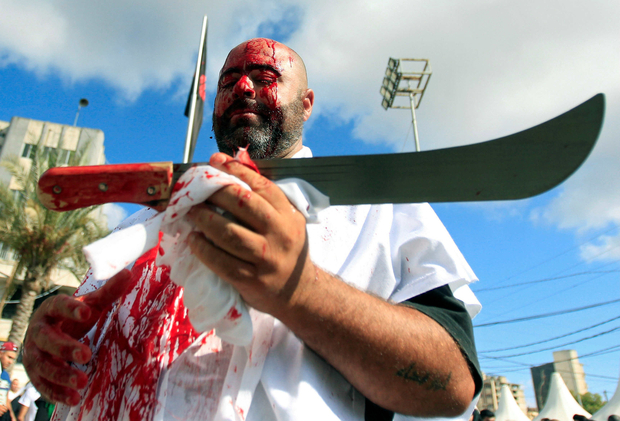Ashura in Lebanon: Donating blood rather than spilling it/عاشوراء في لبنان: تبرع بالدم بدل اراقته
Chloé Domat/MEE/October 02/17
Following Hezbollah’s call to stop gestures of self-mutilation, local NGOs and hospitals encourage believers to donate their blood instead. On Sunday, thousands of Lebanese of all ages gathered in processions to commemorate the death of the imam Hussein, the Prophet Muhammad’s grandson, and the associated battle of Karbala.
While a religious figure recounted the story of the 680CE battle massacre, people walked down the streets in black clothes, wearing headbands commemorating the glory of Hussein and his sister Zaynab.
For the believers, this is a very emotional moment. Some cry while others re-enact the martyrdom by hitting themselves on the head with swords until they bleed. “Take my picture!” said Ali, running towards a group of journalists with a bleeding forehead. “I wanted to bleed because I love Hussein. I do it every year, I want to feel his pain,” said the 19-year-old student from Beirut’s southern suburbs.
But Ali’s bloody face attracted more curious photographers than sympathy, with many in the Shia community disapproving of the act of self-flagellation. “This is just showing off,” said Ali Awad, a 26-year-old graphic designer, who takes part in this parade, coordinated by the political party Amal, every year.
“This is not what Ashura is about, and it can even transmit diseases when people share the same sword,” he said, adding that he has never taken part in the controversial act. This tradition, known as tatbir, has often been divisive. In 1994, Iran’s Supreme Leader Ali Khamenei issued a decree against self-mutilation, describing the practice as “against religion”.
But it continues in parts of Iraq, as well as among parts of the Shia communities of Bahrain and Turkey. Blood donation replacing blood letting. In Lebanon as well, Hezbollah leader Hassan Nasrallah has spoken out against tatbir on several occasions.
A few streets from where Ali celebrated, Hezbollah’s parade was blood-free. Believers simply brought their hands to their chest in rhythm while chanting.
“Here we never make ourselves bleed. It is against religion. God didn’t tell us to do this, neither did Hussein, and Hezbollah prohibits it,” said Hussein, a young customs officer who was watching the marchers from his rooftop.
For Ashura, Hezbollah encourages its supporters to give their blood for a good cause rather than spill it.”Every year, I go and give my blood to an association or a hospital that needs it. A lot of people do the same, too many in fact,” Hussein said. “This time they asked me if I could wait a few days because they thought they would be receiving enough of my blood type,” he said.
A growing trend
Ashura is by far and away the day during which the most blood is donated across the country. Donner Sang Compter and Who is Hussain? are two NGOs that organise the blood drive in Beirut’s southern suburb of Haret Hreik, this year beating their record and receiving 300 units in just a few hours. “Every year we get more,” said Nour Bazzi, president of the Donner Sang Compter club in Haret Hreik. “People are very responsive.”
The units will be transferred to the American University of Beirut’s hospital (AUBMC). The hospital has a large cancer treatment department, where patients and in particular children are in constant need of blood. “We take advantage of Ashura because it is a day when people feel very emotional, they want to give, and in hospitals there is a real need for blood units,” said Hala Smain, one of the AUBMC technicians in charge of the welcoming the donors.
In Lebanon, there is no central blood bank. Patients have to rely on their relatives to find the blood they need from private donors or, in some cases, from the black market. The Red Cross, hospitals and NGOs have been working for years to encourage anonymous and voluntary blood donation.
“We hope that as the years go by, mentalities will change and instead of just giving blood when called upon by a relative, we will see more and more voluntary donations such as this,” she said.
Sunday’s blood drive was organised in one of the town hall buildings. People from the neighbourhood were packed at the entrance filling in the forms to become donors.
“I want to change the image people have about my religion. The media always shows pictures of mutilated faces on Ashura but there is another side to it,” said Ghadir Hamadi, a 20-year-old journalism student waiting in line.
“There are two schools of thought when it comes to Ashura. Some people want to shed blood in the streets; others want to give it for a good cause,” she said. “I really hope I can give, for me it is important to do something useful on this day.” Mahmoud Zeineddine, a 29-year-old man from the neighbourhood who is giving blood for the fifth year, said: “Hussein gave his blood for us, this is something we must respect.
“Our role is also to make our blood useful, not throw it in the street for it to go to waste.”
Images enclosed/A Lebanese man carries a sword as he bleeds after he was cut on the forehead with a razor during an Ashura procession in Nabatieh, south Lebanon on Sunday (Reuters)
























